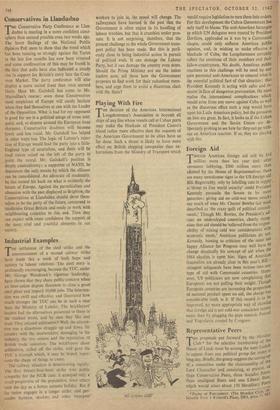Foreign Aid
THOUGH American foreign aid will he $14 million more than last year and, after strenuous lobbying, $300 million more than allotted by the House of Representatives, there are many unwelcome signs in the US foreign aid Bill. Regrettably, only by labelling cuts in supplY a 'threat to free world security' could President Kennedy persuade the Senate to be more generous: giving aid on cold-war terms smacks too much of what Mr. Chester Bowles last week described as 'the crazy quilt of political commit- ments.' Though Mr. Bowles, the President's ad- viser on undeveloped countries, clearly recog- nises that aid should be 'relieved from the respon- sibility of mixing cold war considerations with economic needs,' American politicians do tot' Kennedy, bowing to criticism of the none too happy Alliance for Progress may well have to change drastically his concept of aid when the 1964 election is upon him. Signs of American frustration are already clear in this year's Bill— stringent safeguards have been written into any type of aid with Communist countries. More- over, US politicians are now complaining that Europeans are not pulling their weight. Though European countries are increasing the proportion of national product spent on aid, the charge has considerable truth in it. If this record is to be improved, no more appropriate way of showing that foreign aid is not cold-war conscience money exists than by plugging the gaps towards Poland and Yugoslavia created by Congress.






































 Previous page
Previous page